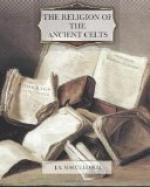Why should immortality be dependent on the eating of certain foods? Most of man’s irrational ideas have some reason in them, and probably man’s knowledge that without food life would come to an end, joined to his idea of deathlessness, led him to believe that there was a certain food which produced immortality just as ordinary food supported life. On it gods and deathless beings were fed. Similarly, as water cleansed and invigorated, it was thought that some special kind of water had these powers in a marvellous degree. Hence arose the tales of the Fountain of Youth and the belief in healing wells. From the knowledge of the nourishing power of food, sprang the idea that some food conferred the qualities inherent in it, e.g. the flesh of divine animals eaten sacramentally, and that gods obtained their immortality from eating or drinking. This idea is widespread. The Babylonian gods had food and water of Life; Egyptian myth spoke of the bread and beer of eternity which nourished the gods; the Hindus and Iranians knew of the divine soma or haoma; and in Scandinavian myth the gods renewed their youth by tasting Iduna’s golden apples.
In Celtic Elysium tales, the fruit of a tree is most usually the food of immortality. The fruit never diminishes and always satisfies, and it is the food of the gods. When eaten by mortals it confers immortality upon them; in other words, it makes them of like nature to the gods, and this is doubtless derived from the widespread idea that the eating of food given by a stranger makes a man of one kin with




